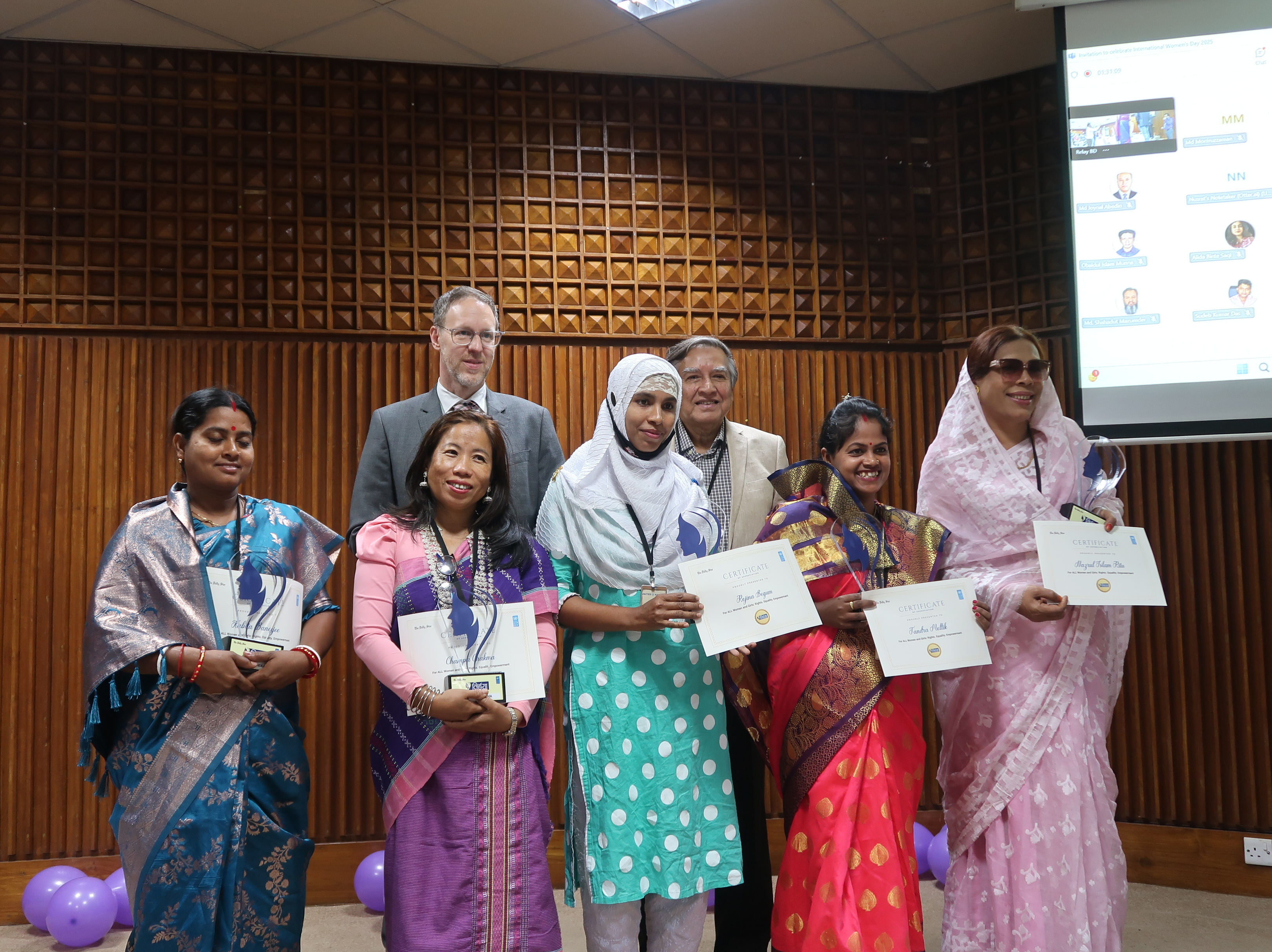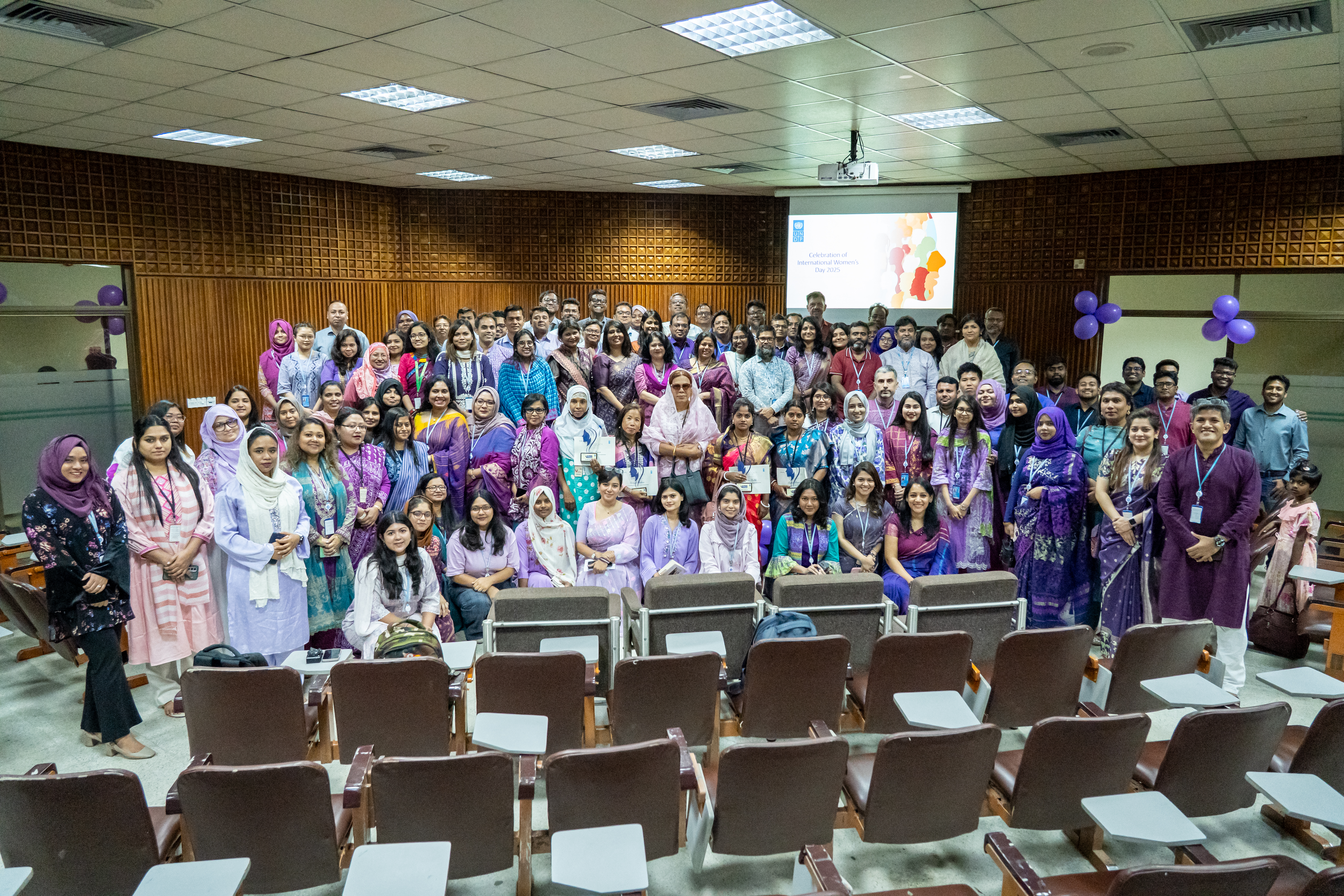
Five grassroots women changemakers get ‘Nirbhaya’ award by UNDP Bangladesh and The Daily Star
Born into poverty and forced into an abusive marriage at a young age, Rogina Begum from Pirojpur seemed destined for a life of hardship. Despite enduring physical and emotional torment, she remained silent, believing that leaving her husband’s home would only lead to more suffering.
However, her determination to build a better future for her children kept her going.
Working as a domestic helper and tutor, Rogina’s life took a turn when she was selected for UNDP’s SWAPNO Project. The programme provided stable employment and financial literacy training, ultimately transforming her life. With her earnings, she invested in livestock and small-scale fish farming, creating a sustainable income.
As part of the celebration of International Women’s Day 2025, Rogina was honoured with the “Nirbhaya” (Fearless) award by The Daily Star and UNDP Bangladesh, alongside four other women — Nazrul Islam Ritu, Tandra Mollik, Champa Chakma, and Kabita Banerjee.
This was the fifth edition of the “Nirbhaya” initiative. The women were recognised for championing female changemakers in grassroots communities at a ceremony at the IDB Auditorium of the capital’s Agargaon yesterday.
At the event, Rogina shared how she became a force for change in her community. She collects school supplies from affluent individuals and distributes them to underprivileged children, finding joy in their smiles. Through regular training, she has gained knowledge to support others, particularly women struggling due to a lack of education.
She ensures they receive medical care and provides warm clothes during winter to ease their hardships. “I wish to raise my children well and achieve greater success,” she said.
Nazrul Islam Ritu, the first elected union parishad chairperson from Bangladesh’s hijra community, shared how she transformed Trilochanpur Union Parishad in Jhenaidah through inclusive leadership.
She spoke about earning the trust of her community, which led her to run for the UP chair.
“I credit women for their support,” said Ritu, emphasising the importance of women’s leadership.
As chairperson, she has resolved numerous legal cases and continues to champion women’s rights.
Tandra Mollik, 28, from Bagerhat, shared her journey of overcoming adversity by empowering women in one of Bangladesh’s most climate-vulnerable areas.
After facing financial hardship during the pandemic, she received support under the LoGIC project, which helped her start climate-adaptive livelihoods such as sheep rearing and watermelon cultivation.
Beyond securing her future, she actively promotes climate resilience by educating women on sustainable farming, water access, and disaster preparedness.
“Not just my future; I also want to ensure a better future for my community,” she said.
Champa Chakma, a young female Karbari (village chief) from Rangamati’s Longadu Union, shared her journey as an advocate for women’s rights and social justice.
As the organising secretary of the CHT Female Headman Karbari Association, she fights against gender-based violence, child marriage, and social injustice. Champa recalled intervening to save a 15-year-old girl from a forced marriage, allowing her to continue her education. “I couldn’t let her future be destroyed,” she said.
She also leads anti-drug campaigns, mediates local disputes, and fosters peaceful coexistence among different ethnic groups.
Kabita Banerjee, from the flood-prone Hariharpur village in Khulna, shared how she overcame climate challenges through financial empowerment.
Despite challenges like floods and rising salinity, Kabita learned climate-adaptive skills and established a mobile cash transfer hub, providing access to banking services in her village.
As head of the Ward 8 Climate and Livelihood Development Cooperative Society, she now mentors 147 women on financial independence, showing that true empowerment is about not just surviving but helping others thrive.
Stefan Liller, resident representative of UNDP Bangladesh, highlighted the organisation’s 50-year commitment to gender equality and urged a focus on the human stories behind statistics.
“We must remember the human stories behind these figures — the individuals who are the true agents of change,” he said.
He praised the Nirbhayas for their remarkable work and emphasised that gender equality, diversity, and inclusion are crucial for progress.
Mahfuz Anam, editor and publisher of The Daily Star, commended the Nirbhayas for their resilience, stating, “Your struggles are extraordinary. I am insignificant compared to you because I have never faced the challenges you have overcome. You have my deepest respect and love, and I will stand by you however I can.”
He acknowledged that financially privileged urban dwellers often fail to understand the struggles of rural women, particularly in terms of economic vulnerability, lack of access to resources, and gender-based violence.
Mahfuz Anam also said men are the biggest barrier to gender equality as patriarchal attitudes persist, even subconsciously, and discrimination against women is perpetuated from a young age, with a focus on marriage prospects for girls rather than professional aspirations, he noted.
He argued that achieving gender equality requires conscious effort within families and recognition that, in terms of intellect, traditional justifications for gender differences no longer hold.
“It is the intellectual strength of human beings — the mind — that determines the world. Both women’s and men’s minds are equal,” he said.
UNDP Gender Team Leader Sharmin Islam highlighted the impact of UNDP’s work in supporting women and girls across the country.
Speaking about the Nirbhaya initiative, she said its purpose is to recognise grassroots women leaders who are not only changing their own lives but also creating positive change in their communities.
“Too often, we only hear about prominent women leaders, while the inspiring stories of local changemakers remain unheard. Through Nirbhaya, we bring these powerful stories to the national stage and inspire others,” she said.
This article was originally published on The Daily Star

